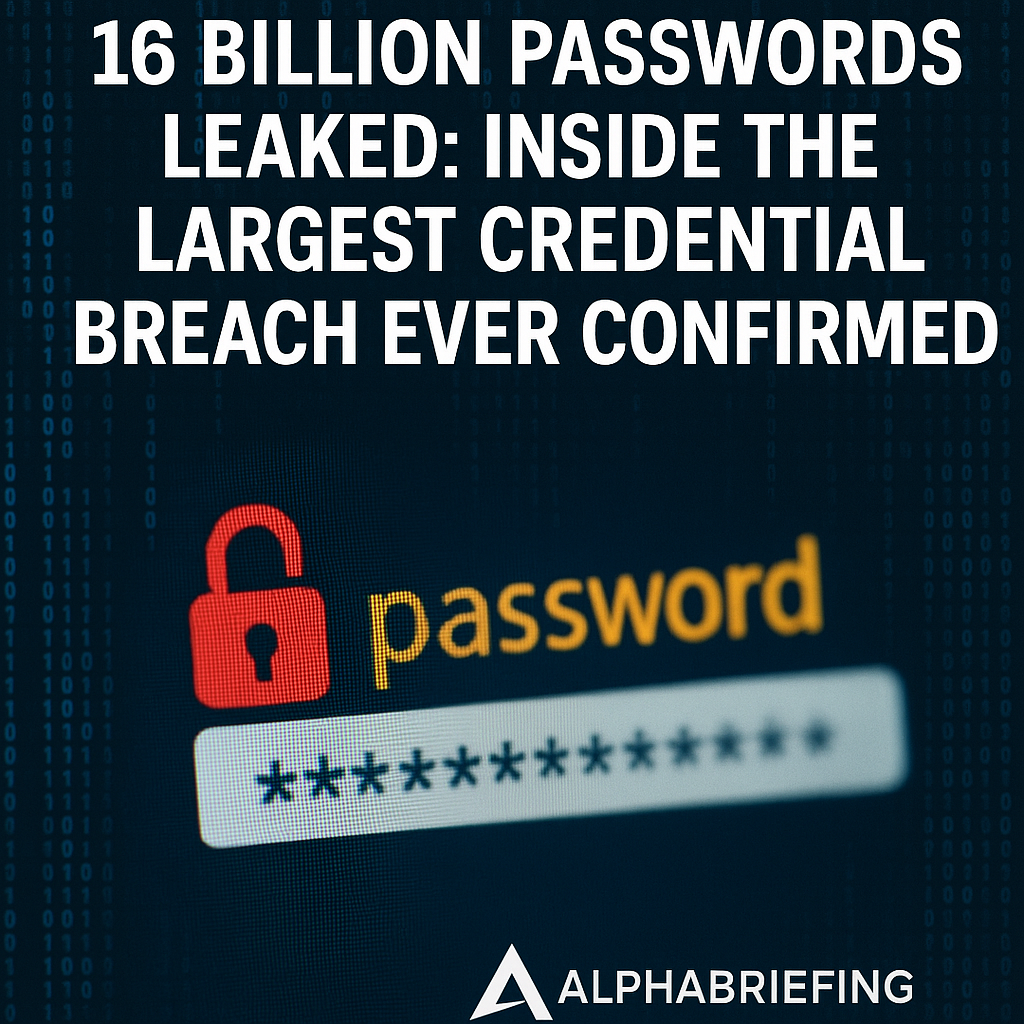Alert: 🔓🚨 16 Billion Passwords Leaked: Inside the Largest Credential Breach Ever Confirmed
In an event now confirmed by multiple cybersecurity experts and media outlets, more than 16 billion unique login credentials — including for Apple, Google, Facebook, and hundreds of other platforms — have been leaked in what is being called the largest password breach in history.

In an event now confirmed by multiple cybersecurity experts and media outlets, more than 16 billion unique login credentials — including for Apple, Google, Facebook, and hundreds of other platforms — have been leaked in what is being called the largest password breach in history.
This isn’t fearmongering. It’s fact.
Welcome to the Infostealer Era — and if you’re not adapting, you’re already compromised.
📌 What Happened?
Security researchers uncovered over 30 massive databases circulating on the dark web and hacker forums. These datasets, many recently updated, include credentials stolen via infostealer malware, poorly secured cloud infrastructure, and exposed developer tools.
The breach includes:
- Apple IDs
- Google and Gmail accounts
- Facebook, Instagram, Telegram
- GitHub, banking portals, VPN logins
- Government and corporate access credentials
And more — much more.
This isn’t a breach of a single company. Instead, it's a curated collection of stolen data from millions of devices infected with malware. The result is a Frankenstein database of global access keys, now for sale and trade across cybercrime networks.
🧨 Why This One Matters
We've seen big breaches before — Yahoo (3B), RockYou (3.2B), LinkedIn — but nothing on this scale and with this level of freshness and usability.
“This isn’t old junk. These are real-world, working logins pulled from infected devices,” said one researcher.
Unlike traditional leaks, infostealers (malware like RedLine, Raccoon, and Vidar) siphon live data: browser-stored passwords, cookies, auto-fill data, even crypto wallets. The average infostealer infection can yield hundreds of credentials per person — and this breach reflects millions of such infections worldwide.
⚠️ Are You Affected?
Chances are, yes. If you’ve reused a password in the last 5 years, you’re vulnerable.
Even if you haven’t, session tokens and cookie data could let attackers bypass login entirely — including on accounts with 2FA.
You can check whether your email is in known leaks at:
👉 HaveIBeenPwned.com
👉 Cybernews Leaked Database Checker
🛡️ What To Do Now
This is the real part. Here’s how to protect yourself:
✅ 1. Change All Reused Passwords
Immediately. Start with:
- Email (especially Gmail/Outlook/Yahoo)
- Financial accounts
- Social media
- Apple ID / Google account
✅ 2. Enable 2FA or Passkeys Everywhere
Prefer authenticator apps over SMS. If available, switch to passkeys, now supported by Apple, Google, and major platforms.
✅ 3. Use a Password Manager
Let it generate strong, unique passwords for every site. Bitwarden, 1Password, Proton Pass, NordPass — pick one and stick to it.
✅ 4. Watch for Phishing
Expect emails, texts, and even phone calls that seem eerily accurate. That’s because your info — including IP, geolocation, and browser history — may also be exposed.
✅ 5. Freeze Your Credit
If your credentials include banking or government logins, place a credit freeze at all 3 major U.S. bureaus (Equifax, Experian, TransUnion). It’s free and critical.
💥 What It Means for Markets and Security
While not immediately tied to financial data, this breach has deep implications:
- Cybersecurity stocks may see a bump (watch: CRWD, PANW, FTNT)
- Expect new government regulations around data retention and password security
- Increased risk of crypto exchange hacks and financial fraud
- Higher demand for zero trust architecture and consumer protection tools
🧠 The AlphaBriefing Take
At AlphaBriefing, we don’t just report — we interpret.
This breach is a signal.
Cyberwarfare isn’t coming — it’s already happening.
And in the digital battlefield, your first line of defense is your operational awareness.
Most people wait for headlines.
You move before the breach hits the wire.
That’s why we brief.
—
🕶️ Join AlphaBriefing Premium for weekly market intel, security alerts, and investment plays before they trend.
Visit AlphaBriefing.com — Access isn’t for everyone.
Disclaimer: This article is for informational purposes only and does not constitute investment advice. AlphaBriefing may hold positions in companies mentioned.
